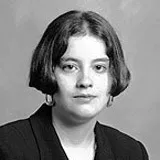Rachel Evadne Goodhue '93

Goodhue is an associate professor in the Department of Agricultural and Resource Economics at the University of California, Davis.
As a professor, I seek to integrate what I experienced as an honors student into my undergraduate and graduate teaching. Thus, it was a very special privilege for me to be invited to serve as an honors examiner in economic development in 2003. What struck me most was how little the core experience had changed for students. The students I examined had mastered the material, and not just the high points of the syllabus. They were committed to thinking about important issues in economic development: the role of agriculture, women and development, and how economic development interacts with the natural environment. Serving as their examiner was an inspiring experience that allowed me to give something back to the Swarthmore honors community.



